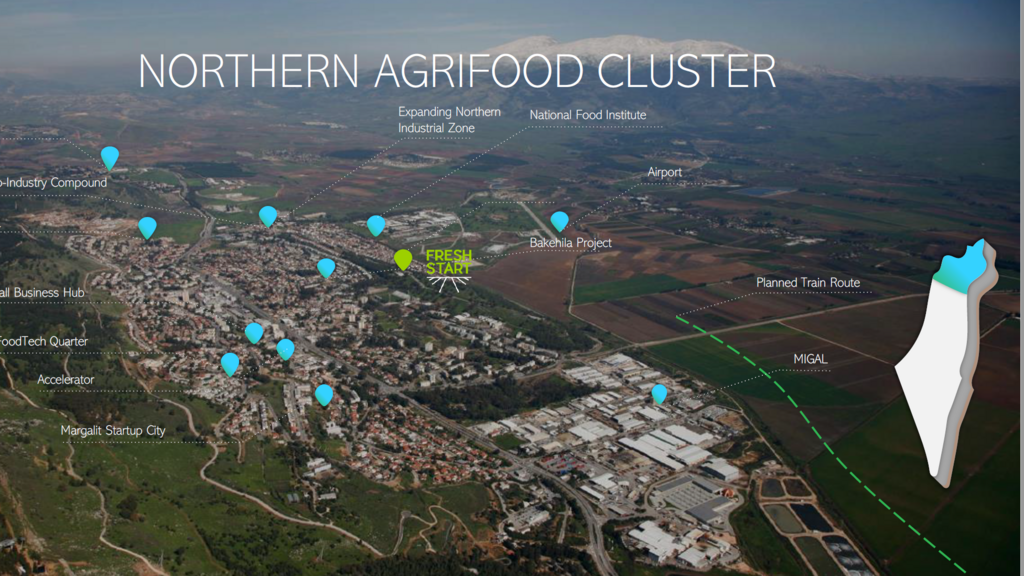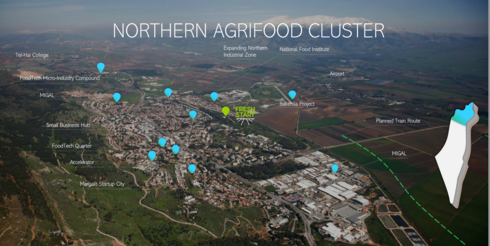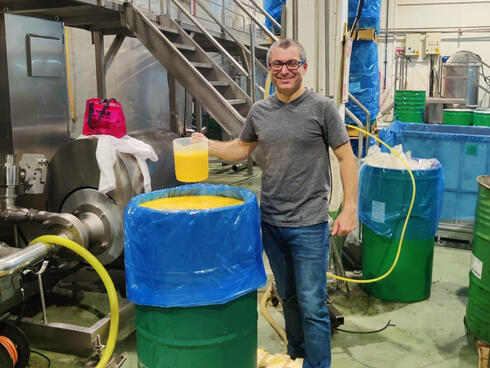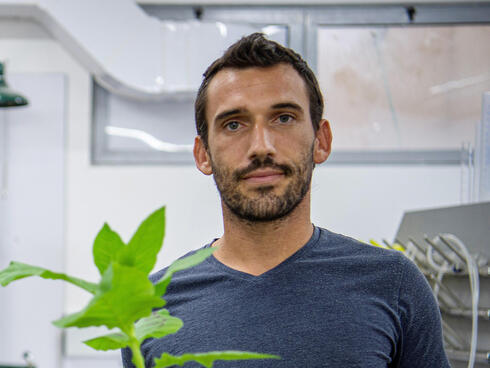
Hezbollah wreaks havoc on northern Israel’s foodtech dream
Dozens of startups in the fields of food and agriculture that operated in Kiryat Shmona and its surroundings migrated south when the fighting began. Despite the jump in costs and only partial government support, entrepreneurs remain hopeful and continue to promote their activities. However, without a change in policy, it is difficult to see how the vision of blossoming the north through high-tech will be realized even after the war ends.
"We chose to stay in the north to maintain our infrastructure and knowledge in the company. The price of this is that some of my employees travel to work every day under missile barrages," Michael Gordon, entrepreneur of the Blue Tree company that started in Kiryat Shmona and currently operates in Katzrin, tells Calcalist.
Blue Tree is one of the only companies in the Fresh Start incubator that chose to stay in the north despite the tangible danger of missiles and rockets from Lebanon. The incubator is operated by a consortium with four leading partners: Tnuva, Tempo, the investment platform OurCrowd, and the investment fund Finistere Ventures.
Several years ago, the State of Israel envisioned promoting regional specialization centers throughout the country, with Beer Sheva as a cyber center and the Galilee, particularly Kiryat Shmona, as a foodtech and agritech hub. A government decision from 2018 allocated NIS 100 million ($27M) to promote this vision. Until October 7, dozens of companies were operating in northern Israel. Today, there is not a single foodtech company in Kiryat Shmona, and all the supporting bodies—incubators and aid organizations—have also left the area and scattered across the country.
Most of the companies active in the Galilee began their journey in Kiryat Shmona or nearby towns with the support of the Innovation Authority. According to the Authority's data, in 2023, out of its NIS 1.5 billion budget, NIS 21.3 million were invested in companies located up to 10 km from the northern border. In 2023, grants of NIS 6 million were given to companies in the Fresh Start technology incubator.
On the eve of the war, about 90 startup companies were operating in the Kiryat Shmona area, employing 500 workers in a variety of positions. Since the war, only 32 companies have remained active in the region, mostly with partial activity, with 60% moving their operations to southern sites significantly far from the north.
"The state's compensation covered 10% of the cost"
The Fresh Start incubator is the organization through which some of the most significant companies in Kiryat Shmona in the foodtech field were founded. Noga Sela-Shalev, the director of the incubator, tells Calcalist, "As of October 7, we realized that there was an evacuation from Kiryat Shmona. This affected our companies in a very problematic way. All the workers and people were scattered throughout the country, and all the companies lost the infrastructure they had here. The immediate thing was to look for ways to create business continuity and also to understand where their employees were located after the evacuation, and to look for a center of gravity for new laboratory activity. There was a good response in the opening of doors. Within three months, everyone found a place, and a lot of activity was focused on this transition. There was hard work with the Tax Authority to receive compensation and grants, and with the Innovation Authority, we received an emergency grant due to the new costs."
Two entrepreneurs told Calcalist that the money from the tax authority was a mockery. Rotem Cahanovitc, one of the founders of Made Right, explains, "We founded the company in Kiryat Shmona in 2022. We, the entrepreneurs, moved our lives to the north and grew to a company of seven people. We build sustainable materials from mushrooms. We grow mushrooms on industrial organic waste, and this creates the base for a bio-mass that is used to produce materials that do not harm the earth. We made plastic packaging from biodegradable mushrooms. After October 7, we realized that it would take time to return, so we set up a laboratory in Rehovot. As a result, three of our employees could not continue to work with us, and the whole process cost us NIS 800,000, while the compensation we received was only NIS 80,000. In the early stages of the company, it’s very important. But we continue to work and register achievements. Not only is what we do difficult, but doing it in the north is very difficult. We moved our operation three times because of the wars, and the investment situation today is very challenging. Many investors from Europe who would have invested in companies like ours now think twice before putting money in."
Dan Sztybel, CEO of Bountica, reinforces these sentiments. "We started in Kiryat Shmona in the Fresh Start incubator. Our company develops the next generation of natural preservatives that extend the shelf life of healthy food products. I was called to the reserves and served in the infantry battalion of the 6th brigade for a total of 170 days. I started as CEO at the very beginning of the war, officially taking full responsibility for the company in January. We were five employees; two were evacuated, one from Kiryat Shmona and one from Metula. The people of Israel opened their doors to us, and we found a laboratory in Caesarea, but one of the significant challenges we faced was the issue of rent. Before the war, it was 2% of our budget, but after moving, it became 48% due to the high rent cost in Caesarea. Before, we paid NIS 6,000 in rent per month, which rose to NIS 60,000 after moving to the center. Now we are relocating to our own place, which is already our third move."
According to Sztybel, biological systems take time to stabilize. "We had to purchase equipment that was available to us in the north at a cost of one million shekels. We received an emergency grant of 120,000 shekels before tax, and that's all we received. We were fortunate to secure an investment at the beginning of October. We were in talks with a company from Belgium that invested significantly in our company. We are currently based in Tsiporit near the Golani junction, where costs are more reasonable. At this stage, we do not see ourselves returning to the north in the next few years due to the costs and the need for stability. Our employees are making decisions about where to settle and enroll their children, and currently, returning to the north does not seem realistic in the near future."
"The inability of the government to manage"
Most entrepreneurs and investors are very concerned about the future of the industry in Kiryat Shmona. Both Cahanovitc and Sztybel are skeptical about returning to the north. "It depends on what the government offers to facilitate our return. Each move is difficult for employees and the company, and without grants and financial support, it is not feasible. The promise of future security is also uncertain. There is no clear outlook for security there, with hundreds of rockets and missiles falling, and the support we received was minimal. We love the north, but security is essential, and there is no clear direction for that. Building what exists there took many years, and it is not just Nasrallah's fault; the government's inability to manage the situation is absurd, with 70,000 evacuees unsure of what to do with their families for nine months, and no one takes it seriously," says Sztybel.
"The companies are scattered across Ramat Yishai, Yokneam, Caesarea, Tsiporit, Rehovot, and Jerusalem. Today, we are not a northern hub but a nationwide one," says Sela-Shalev. "We are currently without our infrastructure but continue to maintain it in Kiryat Shmona with the hope of returning. I cautiously estimate that for companies in the early stages, moving from one place to another is very difficult. Moving them to the north again after the current relocation will be problematic. The first consideration will be whether there is a sufficient sense of security. Any return to the north depends on the willingness of the workers to return. We hear that 30% of the residents of Kiryat Shmona will not return. Those without an anchor in the north will not rush to return. The costs of physical moves are high, and it also depends on the capacity of financing and grants that the state will provide for the return to the north. There is a low probability that companies will return, despite their desire to work and live there.”
Tal Lutzky, CEO of Plantopia, formerly Pigmentum, describes his company's trajectory of upheavals. "Our company has gone through many upheavals since October 7th. At first, we moved to the village of Szold but had to evacuate from there as well. Today, the center of our activity is in Caesarea, and it will be difficult to return to the north. If the north becomes safe again, we may establish activities there, primarily in agriculture and pilots. But moving the company and a laboratory is a complicated event. If possible, we will be in the north and conduct activities there, but conditions must be favorable." Lutzky also emphasizes that the compensation they received as a result of the relocations was very low, and they expect additional support.
Related articles:
Shay Cohen, Tnuva's Vice President of Innovation and one of the investors in the Fresh Start incubator, clarifies, "We made a strategic decision that continuing investments in foodtech is particularly essential in view of the challenges the field faced before and after the war. Our challenge as an investor during this time was to finance excess expenses in our portfolio companies and maintain additional personnel. We lost three or four months, which was crucial for some companies. But we decided to back them up and lead the next rounds together. The Innovation Authority provided impressive support through various grants to both the incubator and the portfolio companies."
One of the most influential people in creating the foodtech and agritech industry in the northern region, with an emphasis on Kiryat Shmona, is Erel Margalit, founder of the JVP venture capital fund and head of the Margalit Startup City project. The group began operating in the Galilee about eight years ago. "We wanted to establish an ecosystem in the fields of foodtech, agtech, and climatetech," says Shimrit Koenig, a partner in JVP and the investment leader in the Galilee. "The activity began through the philanthropic arm—Margalit Startup City Community, alongside a major legislative move that enabled the creation of the ecosystem. The establishment of the ecosystem included partnerships with academic institutions such as Tel Hai and Migdal, the Galilee Development and the regional councils, the municipality of Kiryat Shmona, bringing in international partners such as Cisco, and investors who invested in companies from the region. An accelerator—Studio Galil—was created, working with dozens of startups from the region, providing mentoring, fundraising, and more. Later, the Margalit Startup City Galil center was opened in Kiryat Shmona, and to preserve the ecosystem, operating communities were established in the area."
According to Noam Yosef, who leads the activities of Margalit Startup City Galil's ClimateTech Center, "The most important thing for us since the beginning of the war and the evacuation of the Galilee is to preserve the technological ecosystem of the Galilee, even if the physical location is evacuated. The goal is that when it is possible to return, startups and companies will recover. Our goal is to create a bridge to the day after. Therefore, we conducted a mapping of the startups and their needs. We brought together over 70 startups from the region in Mahanaim with the Innovation Authority and investment factors from Israel and abroad, leading to investments in some of them. We work with various mentors and provide training for managers and employees to succeed during this period. Together with the Innovation Authority, a leading engine in the region, we adjusted tender activity to current conditions, with a plan for the next six months."
Hanan Brand, VP and head of the startup division at the Innovation Authority, tells Calcalist that the Authority mobilized from the first moment to help both the incubators and the entrepreneurs and companies. "The government provided a NIS 10 million grant to bring companies back to the region six months ago, and they are looking for a proper outline for the return of companies in the Galilee. It is estimated that most residents want to return, so companies will be established there. The NIS 10 million plan is a short-term solution, and a five-year plan is needed to return to what it was and to achieve growth. Some companies will not return, but in the long term, growth can continue there."



